
The American destination music festival is a relatively new phenomenon. In the 90’s, music festivals toured the country as big groups of mid-level headliners: Lollapalooza, Lilith Fair, OzzFest, Warped Tour, Up In Smoke, Family Values, etc, etc brought groups likeminded acts to audiences across America over the summer. By the early 00’s, though, this model was no longer sustainable (except for the Warped Tour, which has brought punk bands to teenagers throughout the nation for 20 years). Instead, the destination festival model, patterned after similar major annual events in Europe, came stateside.
Within a few years, Coachella, Bonnaroo, a revived Lollapalooza—based solely in Chicago—and the Austin City Limits Festival made up the Big Four of American music festivals. Instead of one tour playing San Antonio, Dallas, and Houston, everybody from Texas could just all come to Austin for the weekend and see more music over three days.
It’s been successful, both in Austin and beyond—festivals like Outside Lands, Made In America, and Governor’s Ball sprang up in the years that followed, all following the same basic model. A full weekend’s worth of music, with major, internationally-famous headliners, and a packed undercard full of artists that mostly-young audiences with a few hundred dollars to drop on festival tickets want to see. There are some differences between each of the festivals culturally—some run four days, some involve camping, some have 10pm curfews due to local noise ordinances, etc—but they all have a lot more in common than they have to separate them. Most years, the headliners are the same artists.
But the Austin City Limits Festival is a bit different from the rest of its kin in one important way: at ACL, guitar bands still rule.
The days when guitar rock were the dominant form of musical expression for American teenagers have passed, probably for good (laptops are cheaper and everybody has one; you don’t need four friends to make electronic music; the primary means of distribution—a computer—is also the means of creation, which is downright convenient). But at ACL, rock bands have always been the star. The festival has long been notoriously hip-hop averse, and while electronic music acts have enjoyed comfy spots as sub-headliners, Austin City Limits has always been the place to go to see (usually white, usually male) rock bands play guitar.

The Replacements
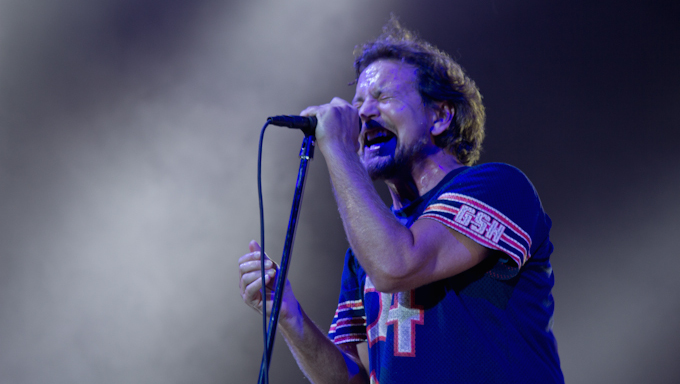
Pearl Jam

Robert Ellis
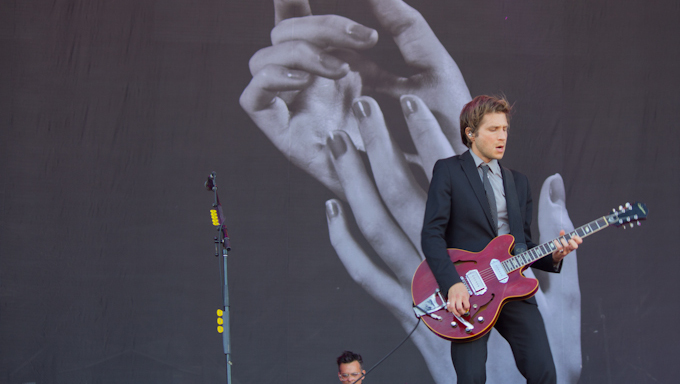
Interpol
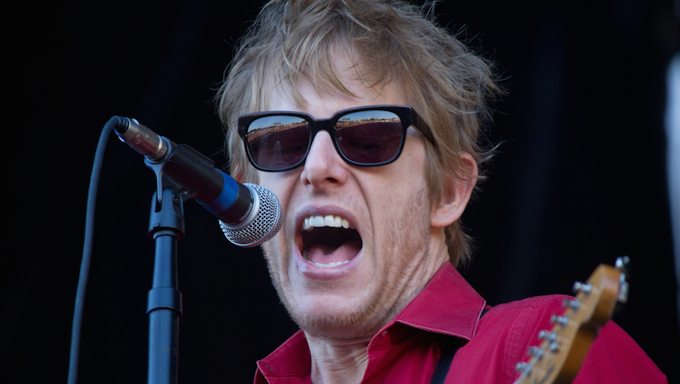
Spoon
They were still out in abundance at Austin City Limits 2014, of course: Pearl Jam was the closing night headliner, occupying a slot previously occupied in recent years by Thom Yorke’s Atoms for Peace; the Red Hot Chili Peppers; Arcade Fire; The Eagles; and, er, Pearl Jam, who also closed out the festival in 2009. Alt-rock icon Beck finished out the night on Friday, meanwhile, though his music has always balanced its love of guitars with an early interest in computers and electronic sounds.
But for the most part, the headliners at the festival this year were a whole lot less rock and roll than in years past. The names in big letters—those artists who occupy the top three lines of the lineup—list thirteen artists, and only four of them are traditional guitar rock bands: Pearl Jam, the Replacements, Foster the People, and the Avett Brothers. The rest of the headliners at ACL 2014 were pop artists (Lana Del Rey, Lorde—who only plays weekend two), EDM artists (Skrillex, Calvin Harris, Zedd, Major Lazer) and rappers (Outkast, Eminem), along with an oddball like Beck.
That’s unprecedented for ACL, but it’s also a reflection of the reality of music in 2014: Culturally, we don’t make rock bands with followings large enough to headline a festival like ACL very often anymore. Bands of that stature that formed in the past fifteen years include the Black Keys, Jack White, The Strokes, Coldplay, Arcade Fire, Kings of Leon, Muse, maybe Mumford and Sons or a few others—but you can count ’em on your fingers, and most of them have already played Austin City Limits in the past few years. Indeed, even Pearl Jam is a retread dating back just five years.
For the most part, the rock bands that are still famous enough to measure up to, say, Eminem or Skrillex these days formed in the 60’s and 70’s. Most of those artists are pretty old, though, and many of them took this summer off from performing. So somebody had to step in to fill the bill.
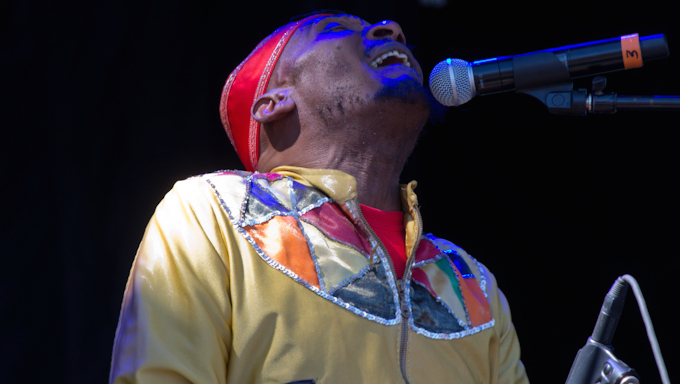
Jimmy Cliff

St. Vincent
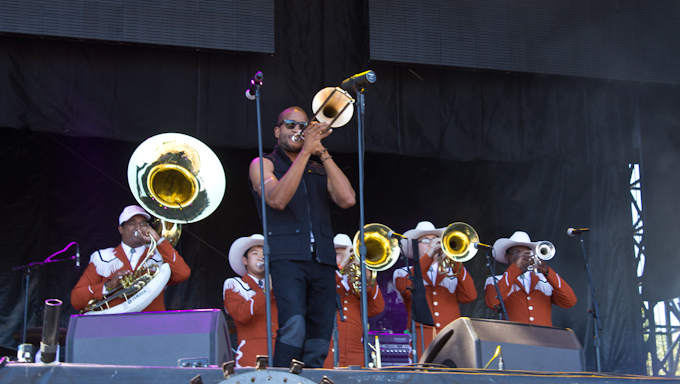
Trombone Shorty

TuNe-YaRdS
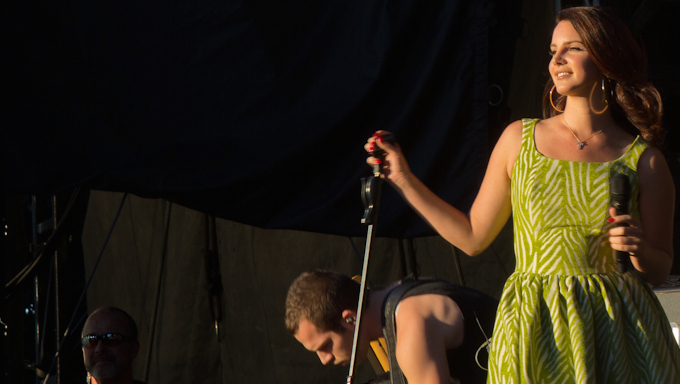
Lana Del Rey
The undercard at ACL is still guitar-heavy, of course: Texas guitar rock heroes like Spoon and St. Vincent were prominent, and indie rock remnants from various decades, from Interpol to The Replacements, played crowded sets. Quieter guitar-based acts like Belle and Sebastien or Houston’s Robert Ellis fill out the bill, as well.
But if the top of the bill this year reflected the fact that rock music is less relevant right now than it’s been in years past, and ACL is a rock fan’s music festival, what’s fest to do?
At Austin City Limits 2014, the plan seems to have been to nod to the fact that it’s time to finally embrace hip hop by booking a pair of rappers as headliners for the first time (and the first rappers to headline any night of the festival since Kanye West in 2011)—while also ensuring that the rappers who did play the festival are rappers who’ve had more than a few guitar-based hits over the years.
That makes sense for the festival, of course—festival-goers who groused about Kanye West’s appearnace are probably all too happy to nod their heads to “Hey Ya!”, and Eminem didn’t become the best-selling rapper of all time by alienating people who like rock music. (His Tupac-like love of sampling 80’s rock ballads is exhibit A.) But it’s still noteworthy that a festival with two rappers headlining the festival had only four rappers on the bill total.

Childish Gambino
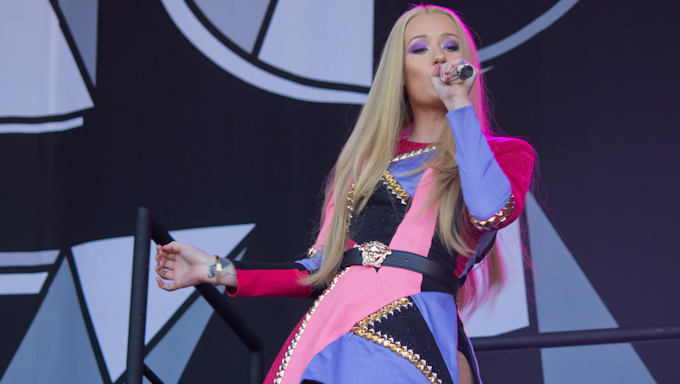
Iggy Azalea
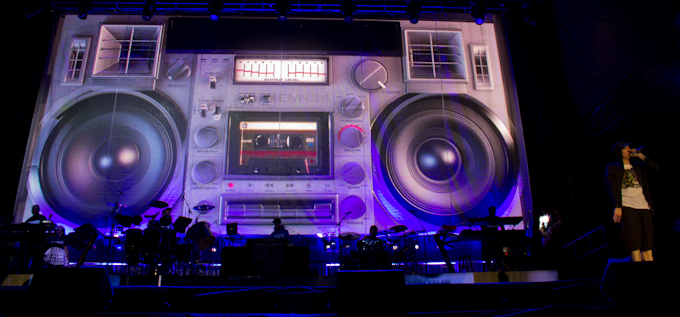
Eminem
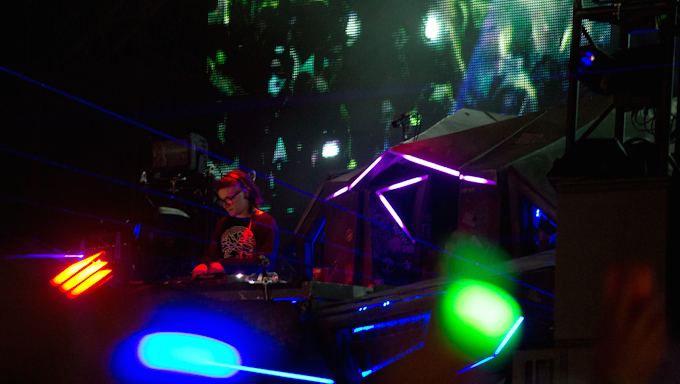
Skrillex
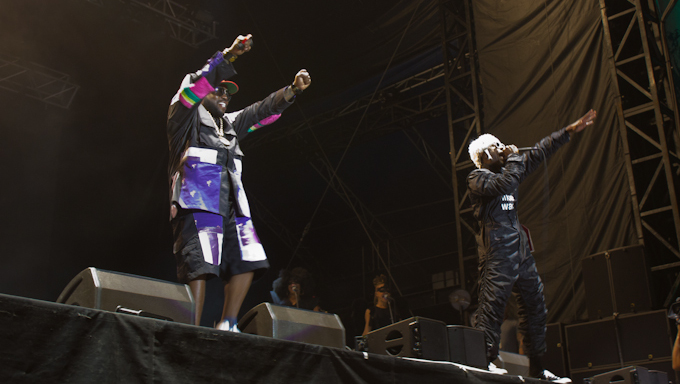
Outkast
The other rap acts on the ACL bill are also pretty easily-palatable to rock fans: Childish Gambino, the nom de rap of actor/comedian Donald Glover, played a packed set to a chant-along crowd on Friday evening, wearing just a bathing suit as he went through his catalog of Internet hits. (Glover’s latest album is called Because The Internet, even.) Iggy Azalea, meanwhile, the Australian rapper/singer who broke out this year with her debut album The New Classic, filled out the bill on Saturday in the early evening.
Electronic music fared better—in addition to the headlining performance from Skrillex, late-day sets from Glitch Mob, Major Lazer, Calvin Harris, and Zedd give the kids something to dance to, and there are more than a few artists on the bill who mix up genres in ways that make them harder to categorize.
But ultimately, the first weekend of ACL demonstrates the fact that even a festival with more appetite for rock bands, country acts, and guitar heroics than its contemporaries on the festival circuit is going to have to evolve into something that better reflects the changing appetites among music fans. Maybe next year Led Zeppelin or The Smiths or somebody will reunite (well, probably not those two bands…), or Paul McCartney will trot himself back onto American stages one more time—but it’s equally likely that the 2015 Austin City Limits Festival will find itself topped by Beyonce, Daft Punk, and Drake. There are probably some fans who’d see that as a defeat, but there are a whole lot more who’d rush the gates for wristbands. That’s just the way culture evolves.
(All photos by Nadia Chaudhury for Texas Monthly)







